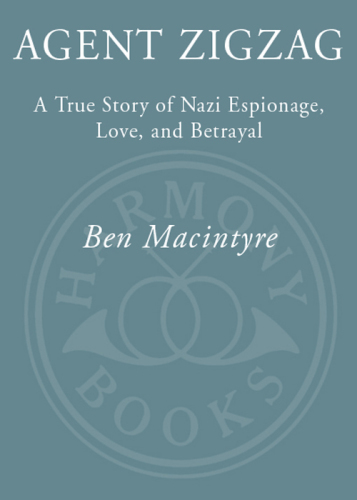
Agent Zigzag
A True Story of Nazi Espionage, Love, and Betrayal
کتاب های مرتبط
- اطلاعات
- نقد و بررسی
- دیدگاه کاربران
نقد و بررسی

July 30, 2007
London Times
associate editor Macintyre (The Man Who Would Be King
) adroitly dissects the enigmatic World War II British double agent Eddie Chapman in this intriguing and balanced biography. Giving “little thought” to the morality of his decision, Chapman offered to work as a spy for the Germans in 1940 after his release from an English prison in the Channel Islands, then occupied by the Germans. After undergoing German military intelligence training, Chapman parachuted into England in December 1942 with instructions to sabotage a De Havilland aircraft factory, but he surrendered after landing safely. Doubled by MI5 (the security service responsible for counterespionage), Chapman was used “to feed vital disinformation to the enemy” and was one of the few double agents “to delude their German handlers until the end of the war.” Meticulously researched—relying extensively on recently released wartime files of Britain's Secret Intelligence Service—Macintyre's biography often reads like a spy thriller. In the end, the author concludes that Chapman “repeatedly risked his life... provided invaluable intelligence,” but “it was never clear whether he was on the side of the angels or the devils.” Of the two Zigzag biographies this fall (the other, by Nicholas Booth, is reviewed below), this is clearly superior.

July 1, 2007
Edwin B. Burgess, a longtime LJ reviewer, is director of the U.S. Army Combined Arms Research Lib., Fort Leavenworth, KSself-helpBy Deborah Bigelow, Director, Leonia P.L., NJ Spiritual Living By Graham Christian Up-to-date Beliefs
We all want to be modern, even in the oratories and meditation centers; this season, "Library Journal" has seen an unusually insistent emphasis on the ultracontemporary, from a Protestant, everyday take on Ignatius of Loyola through the tangles of the web for contemporary Christian parents. We've come to terms with a pagan spirituality that negotiates a dozen traditions for the modern practitioner, as well as the reinvention of the Christian wisdom tradition for a 21st century and global outlook; we've seen the face of God in the crass cleverness of "Family Guy", read a philosopher's bloggings, and found redemption with Katharine Hepburn. With these latest titles, we find Joan Chittister as rewarding as always; among the newer authors, Greg Garrett and Bruno Barnhart prove to be especially worth watching. Barnhart, Bruno. The Future of Wisdom: Toward a Rebirth of Sapiential Christianity. Continuum. 2007. c.218p. ISBN 978-0-8264-1932-3. pap. $29.95. REL
Barnhart ("The Good Wine; Second Simplicity") is also a monk of the New Camaldoli Hermitage in Big Sur, CA. His new book, a substantial contribution toward the renewal of Christian spirituality, is rather more controversial than it might first appear, given Barnhart's good Catholic background. Barnhart seeks and desires no less than a wholehearted rediscovery and reinvigoration of the mystical wisdom tradition that was once a powerful component of Christian spirituality, both Western and Eastern. As he rightly points out, this tradition, which he allies with Aldous Huxley's "philosophia perennis", went into decline hand in hand with the overall decline of monastic orders, as Christianity became more public and congregational in its focus. He sees this moment of history as the "new dawn" of the wisdom tradition within Christianity; whether he is correct, and what role his learned and passionate advocacy will have, only time will tell. For most collections.
Copyright 2007 Library Journal, LLC Used with permission.

September 1, 2007
Macintyres book is due in November. Its nearly 100 pages shorter than Booths and therefore moves at a brisker pace. The author, who first heard of Eddie when he read his obituary, relies mostly on official documents and private papers; whereas wife Betty Chapman was Booths collaborator, in Macintyres book, shes merely another source. The book is less personal than Booths; it reads more like an official history. It should also be noted that Macintyres book may be the more precise of the two: where Booth says Eddie hailed from the town of Burnup Field, Macintyre has it as Burnopfield, and it appears Macintyres spelling is the correct one. Similarly, Booth gives Eddies full name as Arnold Edward Chapman, while Macintyre has it as Edward Arnold Chapman; again, Macintyre appears to be correct. (Although it should be noted that these and other discrepancies in Booths book could be due to proofreading errors, and not mistakes of fact.)(Reprinted with permission of Booklist, copyright 2007, American Library Association.)

























دیدگاه کاربران